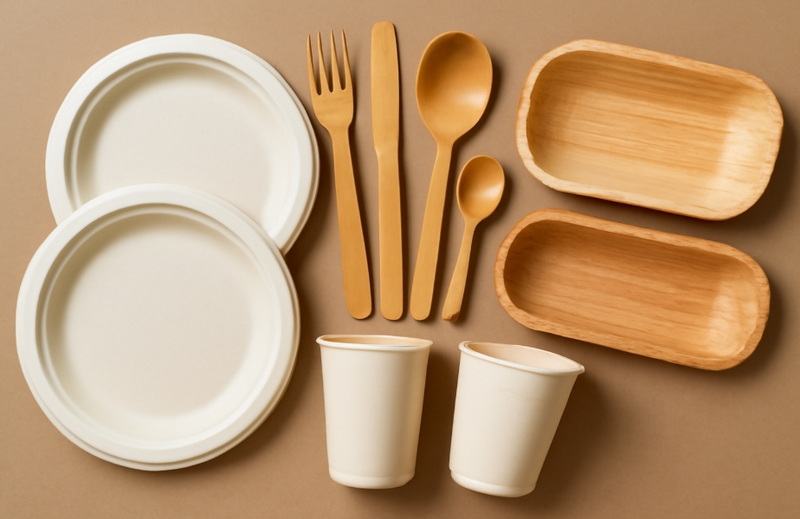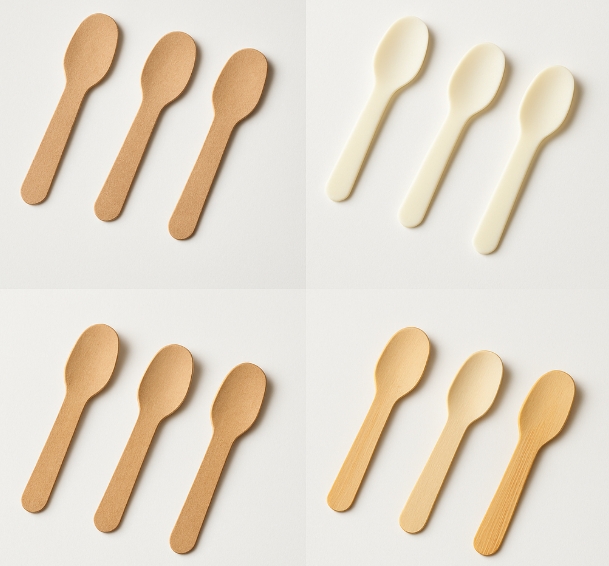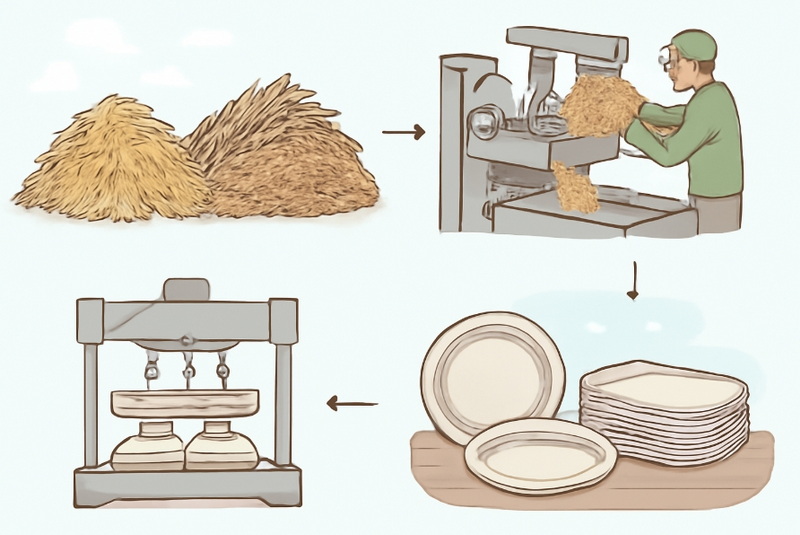
Content Menu
● Understanding Eco-Friendly Tableware
>> Why Choose Wholesale Disposable Tableware?
● Key Materials Used in Eco-Friendly Tableware
>> 1. Sugarcane Bagasse
>> 2. Bamboo
>> 3. Palm Leaf
>> 4. Cornstarch and Bioplastics
>> 5. Recycled Paper and Cardboard
● Leading Wholesale Suppliers of Eco-Friendly Tableware
● How to Choose the Best Wholesale Disposable Tableware
>> Assess Your Needs
>> Evaluate Sustainability Certifications
>> Compare Customization and Branding Options
>> Check Supply Chain Transparency
● Benefits of Wholesale Eco-Friendly Tableware
● Innovations and Trends in Eco-Friendly Tableware
● How to Transition Your Business to Eco-Friendly Tableware
>> Step 1: Audit Your Current Usage
>> Step 2: Research and Sample Products
>> Step 3: Train Staff and Educate Customers
>> Step 4: Monitor and Adjust
● The Future of Wholesale Disposable Tableware
● Conclusion
● Frequently Asked Questions (FAQ)
>> 1. What are the most popular materials for wholesale disposable tableware?
>> 2. Are all eco-friendly disposable tableware products compostable at home?
>> 3. How can I verify the sustainability claims of a wholesale supplier?
>> 4. Can I customize eco-friendly tableware for my brand or event?
>> 5. What is the cost difference between eco-friendly and traditional disposable tableware?
As sustainability becomes a defining value for modern businesses and consumers, the demand for eco-friendly tableware has never been higher. Whether you operate a catering business, manage a restaurant, organize large events, or simply wish to reduce your environmental impact, choosing the right wholesale disposable tableware is essential. This comprehensive guide explores the best wholesale options for eco-friendly tableware, the materials that make them sustainable, how to select reliable suppliers, and the latest trends shaping the industry. By the end, you'll be equipped to make informed, impactful choices for your business or event.

Understanding Eco-Friendly Tableware
Eco-friendly tableware encompasses a wide range of products including plates, bowls, cups, cutlery, and trays. These items are designed to minimize environmental harm, typically by being made from renewable, biodegradable, or compostable materials. Unlike traditional plastic or foam disposables, eco-friendly tableware is intended to break down naturally, reducing landfill waste and pollution.
Why Choose Wholesale Disposable Tableware?
- Cost Efficiency: Purchasing in bulk lowers the cost per unit, making it a practical choice for businesses and large-scale events.
- Consistency: Bulk orders ensure uniformity in appearance and quality, which is important for branding and customer experience.
- Sustainability: Many wholesale suppliers specialize in eco-friendly manufacturing, offering products that align with green business values.
Key Materials Used in Eco-Friendly Tableware
1. Sugarcane Bagasse
Bagasse is the fibrous byproduct left after extracting juice from sugarcane. It is molded into sturdy, heat-resistant, and compostable plates, bowls, and trays. Bagasse is a popular choice for wholesale disposable tableware because it is both affordable and sustainable.
2. Bamboo
Bamboo is one of the fastest-growing plants on earth, requiring little water and no pesticides. Tableware made from bamboo is strong, lightweight, and fully compostable. Its natural look makes it ideal for both casual and upscale events.
3. Palm Leaf
Palm leaf tableware is crafted by collecting and pressing naturally fallen leaves from the Areca palm. Each piece is unique in texture and color, offering a rustic yet elegant presentation. Palm leaf products are sturdy, heat-resistant, and break down quickly after disposal.
4. Cornstarch and Bioplastics
Tableware made from cornstarch or plant-based bioplastics (such as PLA) is compostable under industrial conditions. These materials are often used for cutlery, cups, and lids, providing a familiar look and feel while being more sustainable than petroleum-based plastics.
5. Recycled Paper and Cardboard
Compostable paper plates and bowls made from recycled materials are widely available. They are best suited for light meals and snacks and decompose rapidly in composting environments.
Leading Wholesale Suppliers of Eco-Friendly Tableware
Selecting a reliable supplier is crucial for ensuring quality and sustainability. Here are some of the top wholesale suppliers offering eco-friendly disposable tableware:
| Supplier/Brand | Key Materials | Notable Features | Ideal Use Cases |
| Ancheng | Wood, Bamboo | Customization, global reach | Catering, hotels, events |
| Green Eco Products | Bagasse, Bamboo | Innovative, durable, compostable | Restaurants, large events |
| BioGreenChoice | Sugarcane Bagasse | Zero waste focus, odorless, safe | Restaurants, parties, hotels |
| Efavormart | Bamboo, Bagasse, Paper | Stylish, diverse range, themed sets | Weddings, parties, catering |
| Bio & Chic | Bamboo, Palm Leaf | Elegant, small and bulk orders | Catering, home, events |
| Biopak | Bioplastics, Paper | R&D focus, global distribution | Food service, takeout |
| Pestiv LLC, Papstar GmbH | Bioplastics, Bamboo | Large scale, global presence | Institutional, retail |
| Mann Biotech | Bamboo Fiber | Customizable, reusable options | Promotional, gifting |
| AMS Compostable | PLA, Bagasse | Custom options, compostable | Food service, retail |
| Asia International | Sugarcane Plant Fiber | Microwave/freezer safe, durable | Restaurants, catering |
How to Choose the Best Wholesale Disposable Tableware
Assess Your Needs
- Event Type: Formal events may require elegant bamboo or palm leaf products, while casual gatherings can use bagasse or paper.
- Food Served: Hot, oily, or liquid foods need sturdy, leak-resistant tableware.
- Volume: Estimate your usage to determine the right bulk quantity.
Evaluate Sustainability Certifications
Look for products certified by reputable organizations such as BPI, OK Compost, or FSC. These certifications ensure that products meet strict environmental and compostability standards.
Compare Customization and Branding Options
Many suppliers offer custom printing or embossing for branding, which is essential for businesses looking to reinforce their eco-friendly image.
Check Supply Chain Transparency
Choose suppliers that are transparent about sourcing, manufacturing, and labor practices. This ensures that your wholesale disposable tableware is truly sustainable from start to finish.

Benefits of Wholesale Eco-Friendly Tableware
- Reduces Plastic Waste: Helps divert tons of plastic from landfills and oceans.
- Supports Circular Economy: Many products are made from agricultural waste or recycled materials, promoting resource efficiency.
- Appeals to Eco-Conscious Consumers: Enhances your brand's reputation and attracts customers who value sustainability.
- Complies with Regulations: Many regions now ban or restrict single-use plastics, making eco-friendly alternatives a necessity.
Innovations and Trends in Eco-Friendly Tableware
- Upcycling Agricultural Waste: New manufacturing processes use rice husk, wheat bran, and even water hyacinth to create durable, biodegradable tableware.
- Edible Tableware: Some companies are developing plates and cutlery that can be safely eaten after use, further reducing waste.
- Reusable Options: While disposables are still in high demand, reusable bamboo and coconut shell products are gaining popularity for zero-waste events.
- Smart Packaging: Some suppliers now offer tableware in compostable or recyclable packaging, further minimizing environmental impact.
- Design and Aesthetics: Increasingly, eco-friendly tableware is available in stylish designs and colors, making it suitable for high-end events and brand-conscious businesses.
How to Transition Your Business to Eco-Friendly Tableware
Step 1: Audit Your Current Usage
Assess the types and quantities of disposable tableware you currently use. Identify areas where switching to eco-friendly alternatives will have the most impact.
Step 2: Research and Sample Products
Request samples from several suppliers to compare quality, durability, and appearance. Test them in real-world conditions to ensure they meet your needs.
Step 3: Train Staff and Educate Customers
Ensure your team understands the benefits and proper disposal methods for new eco-friendly products. Use signage or digital communication to inform customers about your commitment to sustainability.
Step 4: Monitor and Adjust
Track usage, customer feedback, and waste reduction. Adjust your purchasing and practices as needed to maximize both cost savings and environmental benefits.
The Future of Wholesale Disposable Tableware
The future of eco-friendly tableware is bright, with ongoing innovation in materials, design, and supply chain management. As governments introduce stricter regulations on single-use plastics and consumers demand greener options, the market for wholesale disposable tableware will continue to grow. Businesses that adopt sustainable practices early will not only reduce their environmental impact but also gain a competitive edge in an increasingly eco-conscious marketplace.
Conclusion
Wholesale disposable tableware that is eco-friendly is no longer a niche market—it is a mainstream necessity for businesses and consumers committed to sustainability. The best options are made from renewable, biodegradable materials such as sugarcane bagasse, bamboo, palm leaf, and cornstarch. Leading suppliers offer a wide range of products suitable for every occasion, with customization, certifications, and bulk pricing to match your needs.
By choosing wholesale eco-friendly tableware, you not only reduce your environmental footprint but also align your brand or event with the values of a greener future. As regulations tighten and consumer awareness grows, making the switch to sustainable tableware is both a smart business move and a responsible choice for the planet.

Frequently Asked Questions (FAQ)
1. What are the most popular materials for wholesale disposable tableware?
The most common materials include sugarcane bagasse, bamboo, palm leaf, cornstarch bioplastics, and recycled paper. Each offers unique benefits in terms of durability, compostability, and appearance.
2. Are all eco-friendly disposable tableware products compostable at home?
Not all are suitable for home composting. Some require industrial composting facilities due to thicker materials or bioplastics. Always check for certifications like OK Compost Home or BPI to ensure compatibility.
3. How can I verify the sustainability claims of a wholesale supplier?
Look for recognized certifications (BPI, FSC, OK Compost), request documentation, and review the supplier's transparency regarding sourcing and manufacturing practices.
4. Can I customize eco-friendly tableware for my brand or event?
Yes, many wholesale suppliers offer customization options such as printing logos, embossing, or unique shapes and sizes to match your branding needs.
5. What is the cost difference between eco-friendly and traditional disposable tableware?
Eco-friendly options are often slightly more expensive due to sustainable sourcing and manufacturing, but prices are decreasing as demand and production scale increase. The environmental and branding benefits often outweigh the marginal cost difference.

















